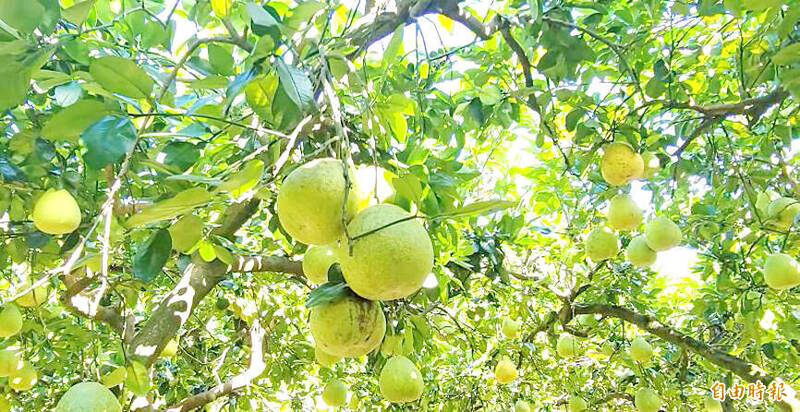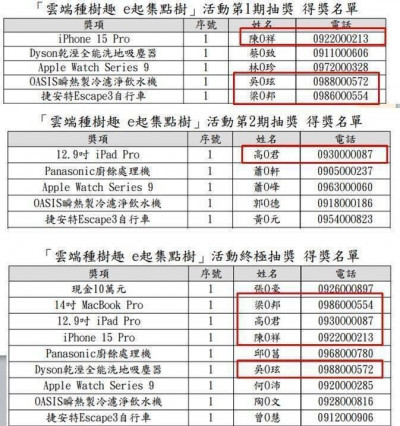《TAIPEI TIMES》China resumes pomelo imports, with caveats

Pomeloes hang from trees in an orchard in Keelung’s Cidu District in an undated photograph. Photo: Taipei Times file
By Shelley Shan / Staff Reporter
The Chinese General Administration of Customs yesterday announced it would resume imports of Taiwanese pomeloes after a temporary ban had been in place since Aug. 2, 2022, provided they come from Taiwanese fruit farms registered with the Chinese government.
The announcement came as Taiwan and China are to celebrate the Mid-Autumn Festival, during which eating pomeloes is traditional, on Sept. 17.
In 2022, Beijing suspended imports of Taiwanese pomeloes after allegedly discovering multiple harmful insects in citrus exports from Taiwan.
It said the the measure was necessary to safeguard biosafety and the health of Chinese, but did not provide any scientific evidence to back its claims.
The Animal and Plant Health Inspection Agency of the Ministry of Agriculture confirmed it received a letter from the Chinese customs agency about its new policy.
The temporary import ban was lifted after Chinese Nationalist Party (KMT) central committee executive director Fu Kun-chi (傅崑萁) and the Hualien County Government had “repeatedly expressed a strong desire” to resume pomelo exports to China, China’s Taiwan Affairs Office (TAO) spokesman Chen Binhua (陳斌華) was quoted as saying in a written statement issued by the office.
“After conducting a comprehensive assessment of correctional measures submitted by some of the fruit farmers in Hualien County and ascertaining that they are in compliance with Chinese regulations on plant quarantine and inspection, the Chinese customs agency decided to resume exports of Taiwanese pomeloes, provided that they are from fruit farms and fruit packaging factories registered with the Chinese government,” Chen said.
Chen said Taiwan and China are one family and should interact on the basis of the so-called “1992 consensus” and oppose Taiwanese independence, adding that “things are easier to negotiate and resolve in the family.”
The so-called “1992 consensus,” a term former Mainland Affairs Council chairman Su Chi (蘇起) in 2006 admitted making up in 2000, refers to a tacit understanding between the Chinese Nationalist Party (KMT) and the Chinese government that both sides of the Strait acknowledge there is “one China,” with each side having its own interpretation of what “China” means.
Taiwan has 45 pomelo farms and 19 packaging factories registered with the Chinese government, with most of them in Hualien County, the Animal and Plant Health Agency said.
Most of the pomeloes were sold domestically after China suspended imports. Aside from finding other potential markets overseas, the ministry has developed processed fruit products using Taiwanese pomeloes such as fresh-cut Taiwanese pomeloes that can be sold in supermarkets.
As of last month, 732 tonnes have been exported to other countries this year, with a majority of them being shipped to Singapore, Hong Kong and Canada, agency data showed.
The three main production sites of Taiwanese pomeloes are Madou District (麻豆) in Tainan, Douliou Township (斗六) in Yunlin and Hegang (鶴岡) in Hualien.
The government would randomly select pomeloes for inspection for export to China, Animal and Plant Health Inspection Agency Deputy Director-General Du Li-hwa (杜麗華) said, adding that the amount subject to random inspection would be twice as much as before.
A similar policy was implemented after Taiwanese atemoya exports to China resumed at the end of last year.
Cross-strait experts warned that the policy changes have political implications.
“The statement from the TAO, which specifically mentioned Fu and Hualien, shows that Beijing wants to highlight the KMT’s role in boosting cross-strait relations. It also intends to send a message that those who agree to its political conditions would receive economic benefits,” Taiwan think tank researcher Wu Se-chih (吳瑟致) said.
“It also aims to use the policy change to influence Taiwan’s mayoral and commissioner elections next year by pleasing farmers and farmers’ associations. The latter are deeply entangled in local politics,” Wu said.
The policy change is also an example of Beijing’s precise targeting in its “united front” work and economic coercion, he said.
“However, given that the government has diversified agricultural exports, what the policy change can accomplish as a ‘united front’ tactic is limited,” Wu said.
Yang Ming-hsien (楊明憲), a professor in the Department of International Business at Feng Chia University, noted that Chinese officials had emphasized opposing Taiwanese independence when announcing the lifting of the ban.
This emphasis on cross-strait issues rather than measurable biosecurity markers indicates that the lifting of the pomelo ban is likely politically motivated, Yang said.
Yang cautioned that China could again restrict exports of the fruit, saying Taiwanese farmers should continue to diversify their markets.
Echoing Yang, Chang Hung-yuan (張弘遠), an associate professor with the Department of International Trade of Chihlee University of Technology, said the resumption of pomelo exports from Taiwan was announced ahead of the Mid-Autumn Festival to assuage pressure from Taiwanese pomelo farmers by raising purchases of the fruit during the peak season.
Chang said the move aims to facilitate unification through economic factors.
Additional reporting by CNA
新聞來源:TAIPEI TIMES























